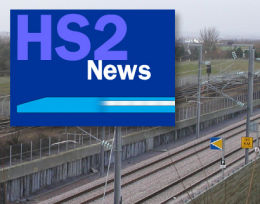Posted 2nd July 2013 | 6 Comments
DfT in clash with MPs over HS2 costs

A SENIOR civil servant from the Department for Transport has clashed with MPs in a discussion of HS2, as opponents continue to argue that the scheme is unnecessary and too expensive.
The Public Accounts Committee of the House of Commons was taking evidence from DfT permanent secretary Philip Rutnam, who said an increase to £42.6 billion for both Phases, which was revealed last week and includes a contingency budget of some £14 billion, was partly caused by the increased length of route in tunnels.
The additional underground sections, which range from a new tunnel under west London in the Northolt area to changes at Sheffield, have been planned in response to opposition and other feedback from those areas.
But MPs on the Committee remained critical. The member for Grimsby, Austin Mitchell, described the cost estimates as 'shaky and flimsy', while the Committee's chairman Margaret Hodge described the timetable, which envisages Phase 1 between London and Birmingham opening by 2026, as 'complete madness'.
She said: "When you get an authorisation for a project, you put a number by it. You are sitting there as a minister: you say 'This is what it's going to cost me.' "
Mr Rutnam said: "We are confident that timetable can be achieved. It's a very challenging timetable and we are confident it can be achieved." He added that the estimates became 'more reliable' as more work was done.
When transport secretary Patrick McLoughlin revealed the new costs in the Commons last week, he insisted that a High Speed network is essential, saying that "even on moderate forecasts, the West Coast Main Line – the nation’s key rail corridor – will be full by the mid 2020s. Upgrades do not provide the extra capacity that we need. The choice is between a new High Speed line and a new conventional railway. The significant additional benefits make high speed the right answer."
Meanwhile new research from the pro-HS2 group Greengauge 21 claims that HS2 will create an estimated 890,000 job years. It's the first third-party assessment of the direct employment implications of the HS2 project.
It includes those who would be employed directly by HS2 Ltd, by its contractors and their supply chains.
Douglas McCormick, who is managing director of Atkins’ Rail Business UK said: “Investment in High Speed rail doesn’t just ensure that the UK has the physical infrastructure needed to compete in the 21st Century, but also that our economy will be strengthened through job growth in the long term.”
Greengauge21 said employment on the project would be maintained at least at 20,000 full time jobs a year over a 13 year period, and increase up to a maximum of 50,000 jobs at any one time.
“This shows the direct value of the project to the British labour market”, said Greengauge 21 director Jim Steer.
“These numbers should not be confused with other employment effects, for instance, from regeneration impacts around HS2 stations, which are not included in this assessment."
Reader Comments:
Views expressed in submitted comments are that of the author, and not necessarily shared by Railnews.

C.Smith, KENILWORTH
The accurate version:
1) Elderly and infirm people will be moved out/lose their homes/suffer years of living metres from a major building project.
2) We have been refused the tunnel that would prevent the above.
3) We still say it is unnecessary and too expensive but lazy people who don't study the facts make facetious comments.
Andrew Gibbs, Coventry
Hmm, all the changes so far (Euston, Northolt, Birmingham, etc) have been implemented because they were found to be less expensive (in time and/or money) compared to the original design. Nothing has been driven by community benefits.
Tony Pearce, Reading
My prediction is that rail travel will fall slightly every year for the next 10 years, maybe more. The reason is that household budgets are being cut during this time and rail travel ( and Motoring ) is for many a 'luxury'. The London commuters I know are also all looking for jobs in Reading so they can save time and money on train fares because they are such a big part of their budget. Businesses are now increasingly looking to the Internet and Tele-conferencing to deal with clients and customers. The latest quarterly indication of rail travel is now showing a slight fall as well. We may be campaigning in a few years to keep lines open, not build new ones.
Simon King, Haywards Heath
One market driver of growth in passenger numbers is the rise in fuel prices. But, as the FT reported in April (and The Times in July) fuel prices are set to plateau if not drop, due developments in the shale gas market.
While I doubt it will scupper the HS2 project it will likely undermine the argument about demand & supply. Rail's capacity limitations could be less pressing concerns if lower prices at the pumps creates a modal switch back to roads.
Right now, equality is the buzzword and although a 'rich man's toy', as Adonis' ill-fated remark suggests is hardly representative of equality, bridging the north/south socio-economic gap may win a broader public vote. Thoughts?
Leslie burge, leicester
Why is it taking so long to get on with it?
we need it now.
Chris Neville-Smith, Durham, England
Or, the abridged version:
1) HS2 opponents claim their lives will be made a misery if large sections of the railway aren't put in tunnels.
2) HS2 get the tunnels they asked for.
3) HS2 opponents claim the extra cost makes the whole thing too expensive.
I'm working on a variation of the Chas 'n' Dave classic "Ain't No Pleasing You".